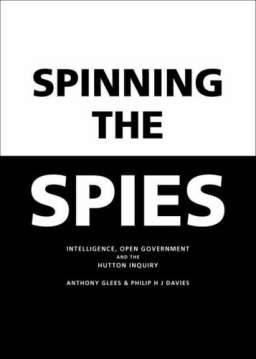Lobster Issue 49 (Summer 2005) £££
[…] Glees and Philip H. J. Davies London: The Social Affairs Unit, 2004, £30, h/b This is a curious little book (112 pp.) in which two conservative intelligence academics wrestle with the realities of the events leading up to the attack on Iraq. But what manner of beast is a conservative intelligence academic? The […]
Lobster Issue 20 (1990) £££
[…] because of Scott’s essay, was banned by the Indonesian government. Scott’s essay is a classic demonstration of parapolitics as a subject area – the presence of covert, intelligence agency activity beneath the surface account of politics, and as a methodology – reconstituting reality from an extraordinary mass of detail. Robin Ramsay In this short […]
Lobster Issue 32 (December 1996) £££
[…] Urban Faber and Faber London 1996 £16.99 The first sentence of Urban’s conclusion to this very interesting and rather important book is: ‘More than anything else, British intelligence is a system for repackaging information gathered by the USA.’ He might have added, ‘information gathered in large part at US bases in Britain’. Urban has […]
Lobster Issue 42 (Winter 2001/2) £££
[…] Next could come the representatives, including the religious and corporate ones, of the various communities in this country and the Commonwealth, who are the beneficiaries of political intelligence, including protection from terrorism. If SIS got the external messages wrong, it did not do too well with the internal ones either. For example, had it […]
Lobster Issue 37 (Summer 1999) £££
[…] the press would uncover evidence that the leftist founder of the Peoples Temple was for many years a witting stooge, or agent, of the FBI and the intelligence community, where it was feared that Ryan’s investigation would embarrass the CIA by linking Jones to some of the Agency’s most volatile programs and operations. This, […]
Lobster Issue 28 (December 1994) £££
[…] affair. The other links her death to her anti-nuclear activities in the early 1980s. Both schools of thought have produced circumstantial evidence which suggests the involvement of intelligence and security services. This involvement is likely to have been at least one remove, through the use of private security firms, or other more secretive organisations, […]
Lobster Issue 44 (Winter 2002/3) £££
[…] Shayler case and human rights David Shayler went on trial at the Old Bailey in October/ November 2002 for disclosing information and documents relating to security and intelligence, under s1(1) and 4(1) of the Official Secrets Act 1989. During the trial he was not able to utilise a public interest defence (previously ruled out […]
Lobster Issue 28 (December 1994) £££
[…] lines by deception and the non-payment of telephone bills. These false charges are the climax to a bizarre series of events. As a researcher in politics and intelligence I have many times been the target of various intelligence agencies. On two occasions I was asked indirectly to join, or co-operate with, the clan. I […]
Lobster Issue 46 (Winter 2003) £££
[…] known to be imperfect and not the only one available. An inability to offer a trustworthy ‘message’ has had particular impact on America and Britain’s Middle Eastern intelligence product because it has undermined its agents, especially ‘agents of influence’.(9) This is one of many reasons why, today, ‘the allies’ have no agents, cannot ‘sell’ […]
Lobster Issue 47 (Summer 2004) £££
Global Intelligence: the World’s Secret Services Today Paul Todd and Jonathan Bloch, London and New York, Zed Books, 2003 h/back £32.95/ $55.00 p/back £9.99/ $17.50 ‘We lacked specific information on many key aspects of Iraq’s WMD program’ Vice chairman of the National Intelligence Council, Stuart Cohen, December 2003 With the spectacular failure […]


